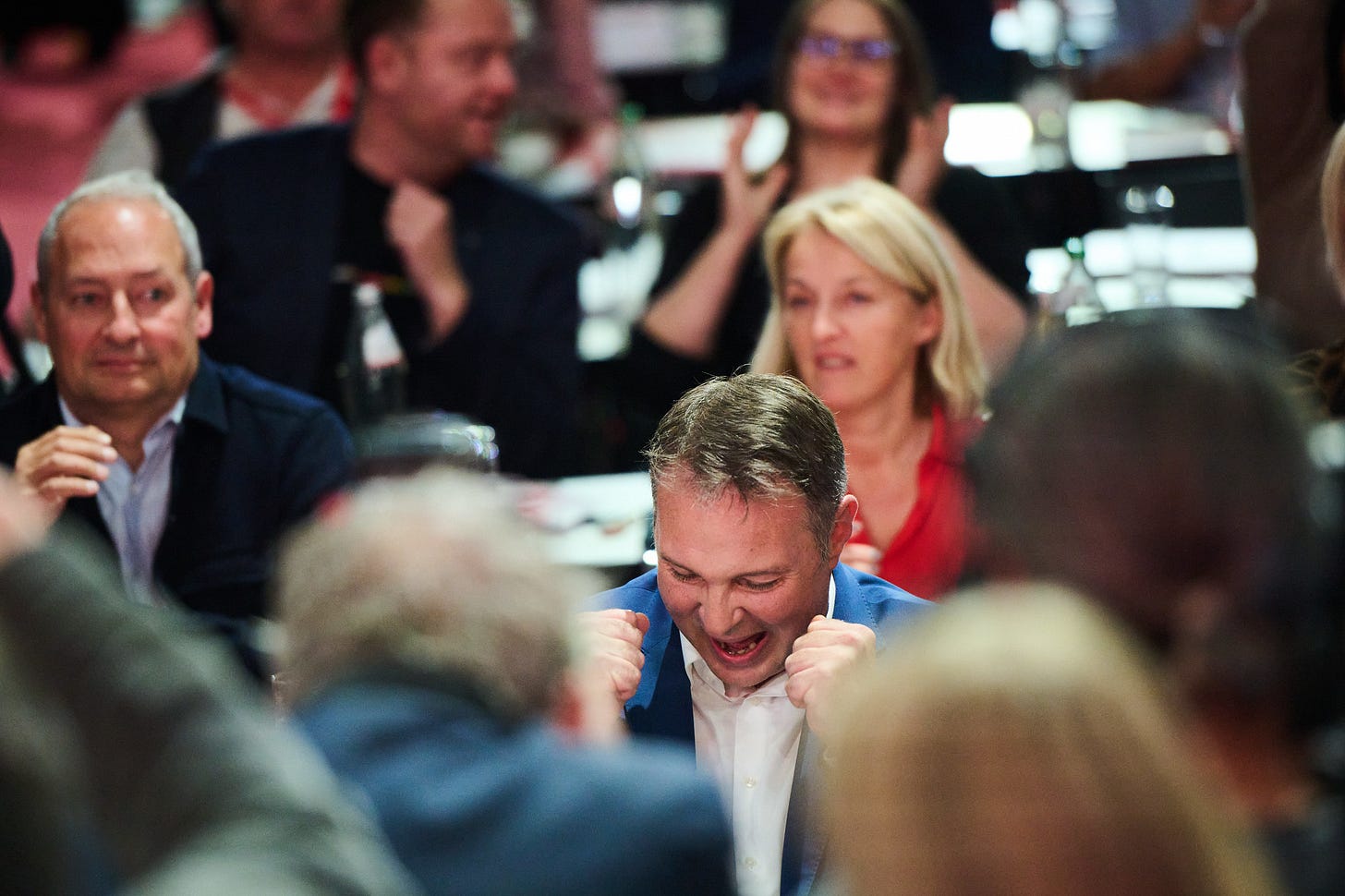Onwards And Sideways
Andreas Babler's leadership of the Social Democratic Party has thus far failed to trigger a political earthquake in Austria

Servus!
Over the weekend, the Social Democratic Party (SPÖ) went down to Graz in Styria for another party conference. The party’s previous gathering in Linz, at which the wrong winner of the SPÖ’s leadership contest was announced owing to a miscount, was a low moment for the Austrian left even in the span of a contemporary history made up almost entirely of missteps and missed opportunities. Andreas Babler’s first conference as SPÖ leader, then, at the very least, couldn’t go any worse than that.
In a confirmation of the actual result of that leadership contest, Babler was confirmed by conference as SPÖ leader with 88.76 percent of the vote. This result was not as resounding as the one former chancellor Christian Kern achieved in 2016, when he won 97 percent of the vote. But neither was it as cruel and humiliating as the one dished out to former leader Pamela Rendi-Wagner in 2021 when she only managed to get the backing of three quarters of the party even though she was only candidate on the ballot.
88.76 percent indicates that Babler, for now, has the backing of a broad swathe of the SPÖ. Dissent has largely been confined to one corner of the party, namely the state of Burgenland, where Babler’s defeated rival for the party leadership, big beast Hans Peter Doskozil, still roams unchained. Doskozil elected to stay away from the party conference in Graz. On Monday, he announced he intends to run for another term as Burgenland governor in 2025. His popularity locally remains strong and his reelection is almost certain. He remains a danger to Babler, even if Doskozil protests he has given up his ambitions in federal politics.
With the proviso that Babler has only been party leader for a few months, it must be said that his rise to the top of the SPÖ has failed to trigger a political earthquake. In the most recent poll published by the newsweekly Profil, the far-right Freedom Party (FPÖ) was able to retain its substantial lead on 32 percent, with the SPÖ coming in second on 23 percent and the governing conservative People’s Party (ÖVP) slipping to third on 20 percent. For the SPÖ, this represents a slight recovery from their position in June—another low point, at which they were polling at 20 percent—but seen in the wide, Babler’s numbers are substantively no different from his predecessor’s.
If Babler wants to become chancellor, his path to power remains rather narrow. Based on this Profil poll, a right-wing FPÖ-ÖVP coalition would have a majority in the next parliament while a center-left SPÖ-Greens-NEOS arrangement would not. Neither would a grand SPÖ-ÖVP coalition. Indeed, all alternative arrangements to an FPÖ-led government would involve the SPÖ, ÖVP, and one other party—either the Greens or the NEOS—getting together. Such a throuple has never been tried at either the federal or state level, not to mention the fact that Babler’s election has furthered widened the gap between center-left and center-right—a divergence which, in Babler’s defense, the ÖVP initiated some years ago.
Early days indeed, but right now, Austrians also don’t see Babler as chancellor material. While 23 percent of respondents said they would vote for the SPÖ, only 13 percent said they would vote for Babler were there a direct election for the chancellorship. Babler is not only running 10 points behind his party in that sense, but in this hypothetical race to the ‘Kreisky room’ on Ballhausplatz, he is stuck in third behind FPÖ leader Herbert Kickl and the incumbent, Karl Nehammer (ÖVP). National polling is tending in the right direction, and maybe slow and steady wins the rice, but with a little under a year to go until election day, Babler is running out of time to make his mark and sell his vision for the country to the Austrian people.
Bis bald!
Thank you for subscribing to the Vienna Briefing. Every recommendation helps, so if you know someone who might be interested in reading this newsletter, consider sharing it with them today.
The Vienna Briefing is a reader-supported publication made possible by your donations. If you would like to contribute to my work, think about sending me a tip via PayPal.
Karel Schwarzenberg, 1937-2023
Former Czech foreign minister Karel Schwarzenberg died Sunday at the age of 85. During the Cold War, Schwarzenberg resided in Austria where he championed human rights and anti-communist causes in central Europe and became a supporter of future Czech president Václav Havel.
Benko Bounced
René Benko has been forced out of the property giant Signa by his minority co-investors amid questions over the company’s debts to European banks. Signa is the owner of the Chrysler building in New York as well as department stores like Selfridges in London and KaDeWe in Berlin.
Brrrr, It’s A Rent Freeze
Rents in Viennese social housing will be frozen for two years as part of package of measures designed to offset the effects of inflation. The City of Vienna owns around 220,000 council flats housing almost 500,000 people—approximately one quarter of the city’s population.



